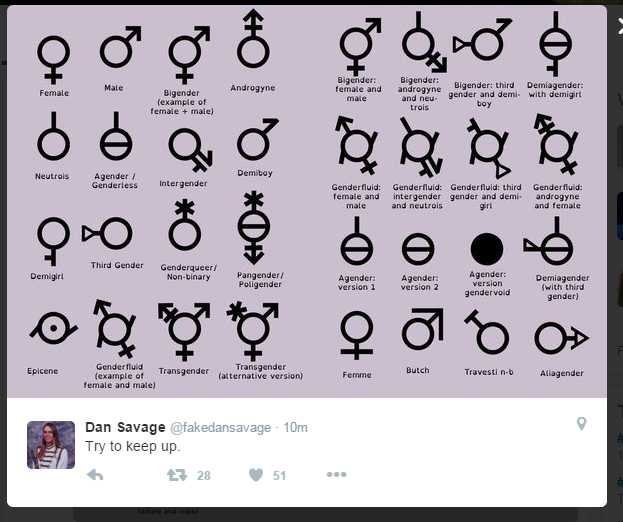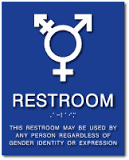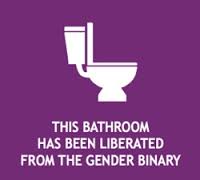 This is going to be a long and rambling blog. My apologies up front. Gender is a complicated minefield of a topic, and I have a lot to say about it. I am no expert, just someone trying to make sense of it all without offending anyone.
This is going to be a long and rambling blog. My apologies up front. Gender is a complicated minefield of a topic, and I have a lot to say about it. I am no expert, just someone trying to make sense of it all without offending anyone.
No matter what class I seem to land in seems to bring up gender as a recurring theme. I have to say, I know a whole lot more about gender now than I did two years ago when I started this program. Gender used to be binary—or at least we only ever talked about it in terms of the male/female binary. Now we discuss gender as occurring in a sphere. Two years ago, I had never heard of a pansexual or a demi-girl, or even the idea that gender occurs on a spectrum and not as the binary male/female boy/girl man/woman paradigm.
Take a look at this chart. It’s not a joke (although, I have to admit, when I first saw it I thought it was). Mind blowing, yes? These symbols represent the current (and rapidly changing) gender landscape.
If you’re like me, somewhere between the ages of 40 and 60, you grew up in a time when gender norms just started breaking down. I remember being a child and overhearing my parents and grandparents complain about the hippies, going on and on about how they could no longer tell the boys from the girls now that the boys had long hair. You grew up when girls no longer had to wear dresses to school and were no longer confined to three careers: nurse, teacher, secretary. If you were an athletic girl, you may have even tried out for the little league team. Title IX had an impact in that girls’ sports got funded, finally.
Women became doctors, lawyers, dentists, fire fighters, and police officers. Men became flight attendants and nurses, started taking care of children, changing diapers. Stay at home dads became a thing. Gender roles became more flexible, but generally males remained males and females remained females. Gay men may have been more effeminate and lesbians more masculine, but boys wore blue, and girls wore pink and nobody played coy about the biological sex of their newborn child.
I grew up as a gender nonconforming child, never fully comfortable in the trappings of girlhood. I preferred my Red Ryder BB gun to dolls and spent my free time outside, building tree forts, fishing, and playing baseball with my brother. I wanted to be a boy but not because I felt uncomfortable in my body. I wanted to be a boy because boys had more freedoms, fewer constraints.
When I was about six, somehow I had heard about sex change operations (what is now called sexual reassignment surgery). Since we didn’t have a television and were fairly isolated in our small community, I have no idea how I might have learned about such a thing. Nor do I know what possessed me to ask my Mema about it, maybe a sense that if I expressed my desire to not be a girl, she would stop buying me girl stuff. But there we were in her Gran Torino—I leaned over the console from the back seat. “Mema, there’s an operation you can have if you don’t want to be a girl anymore. I could be a boy,” I ventured.
She turned to look at me, taking a long drag off of her cigarette. After a moment she blew the smoke out the side of her mouth away from me. “Those people are sick,” she announced and turned around to back the car out of the driveway. End of discussion, but message received loud and clear.
These days I sit in classes with people who introduce themselves and then announce their preferred pronouns, as in, “My name is Jennifer and I prefer the pronouns ‘she’ and ‘her’.” I have to admit, the first time I heard such an introduction I didn’t quite know what to make of it. Many of my classmates identify as queer or pansexual, and there are a lot of trans* people at Antioch. I generally introduce myself as a lesbian, but I recently learned that many younger people believe that to be a lesbian is to be transphobic.
I am not transphobic, though I have a lot to learn and am still wrapping my head around what it means to be trans*. I’m pretty sure it’s more than feeling like a boy who is trapped in a girl’s body or vice versa. Recently, I’ve listened to speakers who identify as trans* but not as transwomen or transmen, just trans, as in somewhere in between or not even.
One speaker said that he (and he did identify as a transman) probably wouldn’t have transitioned from female to male had he stayed in his native country. In his homeland, being a butch lesbian pushed the cultural boundaries enough. But when he moved to the U.S., he decided to transition because being a butch lesbian wasn’t far enough out there, culturally speaking. He wanted to push the boundaries further.
I don’t think I want to be something other than a cisgendered lesbian. But I do understand what it’s like to be misgendered and misunderstood.
I’ve written about this before here, but it’s a story worth repeating. A number of years ago, I took my then four-year-old nephew to the community pool near his home in a very upwardly mobile suburban enclave in the Pacific Northwest. I wore my one-piece speedo swimsuit and a pair of cargo shorts, and sat on the edge of the hot tub where he enjoyed a soak and roughhoused with a couple of friends. He looked up at me as I dangled my legs in the bubbling water.
“Auntie Pammie,” he said, “are you a boy or a girl?”
I looked back at his wide open and innocent face, and I could tell immediately that he was genuinely puzzled, that his four-year-old awareness of what made a boy a boy and a girl a girl was in direct conflict with what he saw represented in me. In his world, girls did not have short hair and wear cargo shorts. In his world there was one way to be a girl and another to be a boy, and he could not figure out where to put me.
“It must be confusing,” I said to him. “You don’t usually see girls with such short hair or wearing clothes like I wear. But, I’m here to tell you, I am a girl, buddy. I’m definitely a girl.”
I smiled at him and thought about all of the ways I could identify myself as a female. I have big boobs for one thing, but I wasn’t going to go there with a four-year-old. I wore diamond earrings, but that didn’t make me a girl anymore, not like it did 25 years ago. I shaved my legs. I was, in fact Auntie Pammie. I tried to think of how else I could convince him that I was a girl, beyond the obvious.
“Okay,” he smiled and went back to playing with his friends in the water.
I breathed a sigh of relief, and his question has become a bit of family folklore. My brother and sister-in-law were slightly mortified when I relayed the question to them later, but once I started explaining his confusion, they began to understand. He wasn’t being impolite or impertinent. He simply had no social construct for me.
While I can easily forgive my nephew his four-year-old’s confusion and innocent question, I’m more hesitant to grant a pass to the woman who mistook me for a man in the women’s restroom awhile back. I had just finished washing my hands in the public bathroom at an Oregon beach when a woman entered, saw me, and, obviously startled, went back out to look again at the sign on the restroom door. I just shook my head and walked by her, leaving her to puzzle things out on her own.
Incidents like the one at the beach happen to me fairly often, more so recently. I would like to say that I am unfazed by people’s confusion, but their obliviousness continues to bother me.
We need to push the boundaries in order to stretch the social construct. That’s what this shift in gender identity is all about. And while many of us are beginning to understand and accept that some people are born “in the wrong bodies” and want their minds and bodies to match (though, there is a school of thought that purports if we could culturally accept gender as nonbinary, and accept everyone just as they are, there would be no need to make our bodies and and our minds match vis a vis sexual reassignment surgery, but it’s a controversial stance. For more info, check out Alice Dreger and her TED Talk), it’s still pretty radical (and, frankly challenging to grasp) to consider gender as nonbinary, as not an either/or but as a whatever.
Changing (or negating) our genders to push the boundaries? I guess that’s where change happens. On the boundaries. If no one ever pushed, nothing would ever change.







